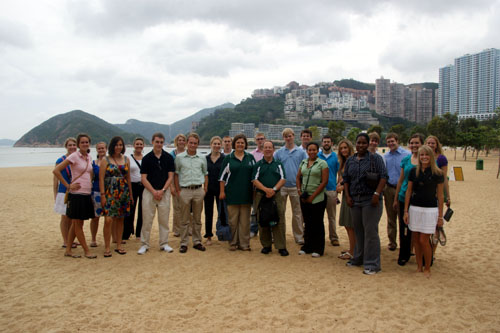I was a millionaire before I left Saigon, but in Hong Kong, I’m a pauper.
Part of that came from the currency alone. The unit of money in Saigon is the “dong,” which is in serious need of reducing the number of zeros. One dollar equals around 18,000 dong, so when I had to pay for the group’s 24 rickshaw rides around the old city, I had to pay over 3 million dong. I guess a million doesn’t buy as much as it used to!
By contrast, Hong Kong is a place where you can easily spend a million dollars—U.S. With its incredible setting of the islands and Victoria Harbor, it’s easily one of the most beautiful, and certainly one of the most memorable cities in the world. A duty free special administrative region of China (since 1997; a British Crown Colony for nearly 150 years before that), Hong Kong is a city of almost 7 million that bills itself as a shopper’s paradise, and it fully lives up to its billing.
We flew here from Saigon early—we left our hotel at 4 a.m. for the 6 a.m. flight (that goes on to Chicago!), arriving, with time zone change, at our hotel around noon. Our rooms were not ready, so we scattered to savor the delights of the city—duty free and tax free clothing, electronics, tailor made suits (I went to my tailor and found that indeed I had eaten well this trip), eye glasses, the Scout Shop (the Hong Kong adult leaders have a tailor made dress uniform that looks like a tuxedo), tickets for a Saturday trip to Macau, a jaunt through Kowloon Park, which has a pool with a waterfall—all before checking in to the hotel. My colleague, Professor Trimble, vanished to view Disneyland here in Hong Kong; she’s a former employee of the Magic Kingdom, and HAD to see what the smallest park was like.
I’ve probably spent more time in Hong Kong than in any other Asian city, partly because in the old days, it was the gateway to China. You flew to Hong Kong, then went on to Beijing or elsewhere, then came back from China to Hong Kong before your flight to Chicago. That’s changed to some extent because you can now fly direct from Shanghai or Beijing to Chicago (as the students will do next Friday and I’ll do in two weeks).. That’s a metaphor for what’s happened to Hong Kong as an entrepot for the China trade, too.
Once the funnel for most of China’s trade with the West, Hong Kong has a rival in Shanghai, which now draws the Yangtze River valley to itself, as the Chinese government has gone from punishing Shanghai as the former bastion of capitalism, to building it up as its most modern city and financial capital (the New York of China). Hong Kong has a major container port (either it or Singapore usually does the most volume in the world), as the contact point for Guangdong province (you might have heard of Shenzhen and Dongguan and the other cities just north of Hong Kong in the Pearl River delta that produce much of China’s export for the world). Like Singapore, it is a city that depends on location and its human capital. Trade and tourism are down here, too, though the Chinese government has made it easier for mainlanders to get visas, and the word is that rich Chinese (and there are a lot of them; remember, if you’re one in a million, there’re 1,500 Chinese just like you) are increasingly coming to Hong Kong to buy real foreign brands at a savings of 15% of mainland prices. Certainly Nathan Road (the main shopping street in Kowloon) has no shortage of people mobbing the street, giving one the sense of energy that differentiates it from Singapore. One of our business speakers, an IWU alum from Galesburg, noted that Hong Kong is the place to work when you’re single, Singapore when you’re married.
Having experienced Bird Flu and been criticized for not doing anything about it, Hong Kong is determined to avoid the swine flu. You may remember that a Mexican tour group got confined to a hotel for a week (and left praising Hong Kong, meaning even being confined to a hotel might be considered a treat). When we got to the Cityview Hotel, which has been running at 86% capacity for the year (I saw the figures and experienced the result), we were greeted by masked employees who shunted us to a corner where they scanned us for temperature before we were let in. The hotel had a sign on the elevator buttons that indicated a sanitizing of the buttons every hour.
One of the joys of visiting Hong Kong is visiting friends here. When I went to a conference in 1994 in Saigon, I met a Chinese professor from the City University of Hong Kong, and every time I’ve been here, we’ve visited. It’s become a tradition for her to take my group out to a Chinese restaurant for a very Chinese meal, not the kind that the tourist agencies arrange. Here are my tips for a great eating experience:
1) you get in an elevator and go higher than the first floor (there’s a ground floor then a first floor)
2) when you get off the elevator, no one speaks English. In Hong Kong, that may include not speaking anything but Cantonese.
3) you don’t see the people staying in your hotel, or any tourists for that matter.
4) there’s no gift shop.
5) there’s no menu in English, and no pictures on the menu.
6) your Chinese host says, “I don’t know the English name for this…”
I do know we had some exotic items that my friend said were very expensive, and I know we had roast goose (because the head was on it), and a big fish, pig’s tongue, and chicken feet, and lots of semi-identifiable and “you don’t want to know” foods. Can you imagine the look on students’ faces? We have one who had never eaten rice or fish….
Yesterday combined business and pleasure, which is a great way to travel. Our alum, Matt Dredge, who works for PWC, got six of his coworkers or
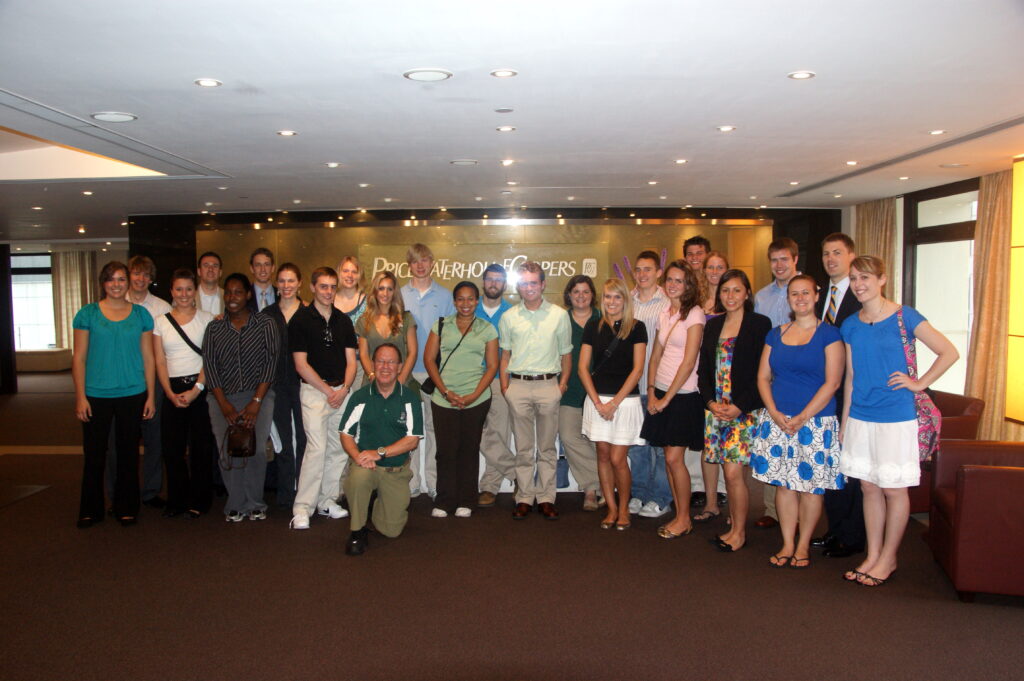
friends together, and met us at the PWC conference room. They came from a variety of countries and states, and not all were accountants, but gave us a great picture of what it’s like to work in Hong Kong. The general consensus was, “Work hard, play hard,” and the advice for Americans who want to come to Asia was, “Be invited by your company, because if you are, you’ll get an expat package, which includes housing allowance, transportation, and many other amenities.” If you come because you want to, you’ll have to pay—and in Hong Kong, real estate can be expensive. One rents a 350-square foot apartment (I have a tent that size, I think) for nearly $1,800 a month. No wonder so many restaurants and bars exist; it you’re going to party with friends, you have no room at home to do so. And they did point out that the expat privileges are becoming fewer and fewer as more companies retrench. The students also raised a tough question—repatriation. I would imagine it’s difficult to go back to the states after Asia. I empathize. Sometimes it is for me, too.
The city tour takes you to four or five places that aren’t as easy to get to as the main shopping and residential areas (Hong Kong has a subway, ferry, bus, and train system that moves people quite well). The trip includes Aberdeen, which used to be the home of the “boat people,” but they’re fewer and fewer in number, Repulse Bay, which has a nice beach protected by a shark net, and a newish and splashy temple, Stanley, site of a world War II prison camp, now a place that entraps foreigners, with its combination of lower-priced Western brands and pretty neat Chinese items, not the standard “tourist market,” and the 1,200-foot Peak, which 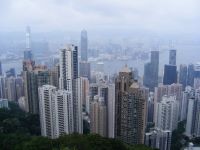
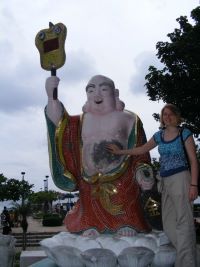 provides the backdrop for the skyscrapers in the central part of the city. I remember the first time I took Mrs. Hoyt here. I asked her what she wanted to see. She said, “Old buildings.” I said, “There’s one. It’s from 1950.” Which is almost true. See the movie, “The World of Susie Wong” if you don’t believe me.
provides the backdrop for the skyscrapers in the central part of the city. I remember the first time I took Mrs. Hoyt here. I asked her what she wanted to see. She said, “Old buildings.” I said, “There’s one. It’s from 1950.” Which is almost true. See the movie, “The World of Susie Wong” if you don’t believe me.
Hong Kong, according to our guide, grew into what it is during the 1960s. It was probably due to two events: the Vietnam War, which channeled a lot of money to Asia, and the Cultural Revolution in China, which sent almost a million refugees into Hong Kong. The incredible energy here is palpable.
One other treat for me is to take advantage of the ferry system and the fact that Hong Kong consists of a number of islands other than the main one and Lantau (where the airport is located). Hence, last night Carrie and I took the ferry to Cheng Chau island, a place where the locals get away for a weekend. It was fun navigating the subway system to the wharf area, where we caught a boat and got to the island. Finding a restaurant was hard/easy because they met most of my requirements set out above, but there was no Eleanor to help us order. The upshot was that someone took pity on us, we ate, took the ferry back to the Star Ferry, then the subway back to our hotel. Hong Kong is truly spectacular at night.
Saturday, I bought tickets for the jetfoil to Macau. Macau fascinates me because it was one of the first European possessions in Asia, and also the last. Conquered early by the Portuguese, it remained in Portuguese control until 1999, when it was handed over to the People’s Republic. Like Hong Kong, it’s now a special administrative region. Though it’s probably best known as the Las Vegas of the East for its gambling casinos (which have increased in number since the handover to 26, some owned by Americans; under the Portuguese, Stanley Ho had the monopoly; the money he made earned him four wives and a home on the Peak in Hong Kong) Macau still has a Mediterranean feel. The government buildings are in pink (you read it correctly); the town is 40% Catholic, with a number of churches that one of our students remarked remind her of colonial churches in Mexico. The Franciscans and the Jesuits contested each other and the dominant Buddhist religion. At one of the temples, Caleb Cushing signed the Treaty of Wanghsia with China that got Americans into China’s Century of Humiliation, extending the rights Britain had gained by force in 1842. 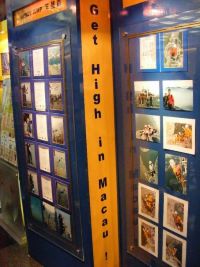 Because Portugal was neutral in World War II, the Japanese did not invade its colonies, so Macau was not destroyed then. Development may do so. There’s now a tower that has sky jumping and bungee jumping—about four times the height of more famous places in New Zealand.
Because Portugal was neutral in World War II, the Japanese did not invade its colonies, so Macau was not destroyed then. Development may do so. There’s now a tower that has sky jumping and bungee jumping—about four times the height of more famous places in New Zealand.
We split into groups, and I gave my thoughts on what to see–the ruins of 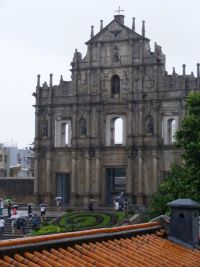 St. Paul, the most famous non-church in Asia—it burned in a fire in the early 19th century, leaving only a wall; the old fort and the new museum; the Leal Senado, the center of commerce, which is very Mediterranean in its pastels; the churches; the Protestant cemetery, whose tombstones tell the litany of life in Asia—died storming the forts at Canton, died at sea, died of malaria, died during childbirth, and where to eat (the old Portuguese officer’s club is now a restaurant). And we went our separate ways.
St. Paul, the most famous non-church in Asia—it burned in a fire in the early 19th century, leaving only a wall; the old fort and the new museum; the Leal Senado, the center of commerce, which is very Mediterranean in its pastels; the churches; the Protestant cemetery, whose tombstones tell the litany of life in Asia—died storming the forts at Canton, died at sea, died of malaria, died during childbirth, and where to eat (the old Portuguese officer’s club is now a restaurant). And we went our separate ways.
Two things altered my wonderful plans. One was the weather. I just had dinner with Mark Sheldon, and IWU alum who lives and works here, and he said, “I thought it was a typhoon.” It rained steadily and violently all day, and Mark said he wondered if the jetfoils would run. They ran, but we had a hard time doing anything outside other than sloshing.
My group had an experience that they’ll remember for a long time. I talked with a driver about getting a van tour, and listed all the places I wanted to go, including the gate to China, the island of Taipo, etc. “No problem,” he stated, which should have alerted me; no problem usually means, “we have a problem.” We didn’t know it, but we would.
He took us where he wanted in the morning, and when we asked about lunch at the officers club, he said he knew a restaurant much closer that had Luso-Chinese food (that’s Macau), and left us there, telling us to meet him again in 3 hours for the rest of the tour.
Fighting the rain by staying in museums or under eaves as much as we could, we were back at the anointed spot at 3—and no driver. By 3:30 we realized we had no information about him—his name was “Ronald,” he told us, and I spotted “Choi” on the license he showed us, but I could not name his company or license—and he had purses and cameras in the car.
Some took a taxi back to the Ferry terminal, while the rest of us pondered what to do. We finally realized the driver had contacted the restaurant originally, so maybe the restaurateur could contact him? As it turned out, the restaurant was closed, but Dan Cummings (bless him) knocked on the door, and the owner told us that the driver had been in an accident and wanted to talk with me. He said he was “sorry” and would be there in time to get us to the ferry.
He did. When I suggested that he might refund some of our money because he had not fulfilled his contract, he got indignant about how much the accident would cost him, etc., etc., but finally eased our pain. But not enough to prevent us from reporting him to the tourist bureau, and putting the story into my marketing class as a poor example of service recovery.
As you can tell, we are having an adventure. I think everyone will be reluctant to leave Hong Kong, but you can see why I am not leaving here a millionaire. Too much to do, too much to buy.
